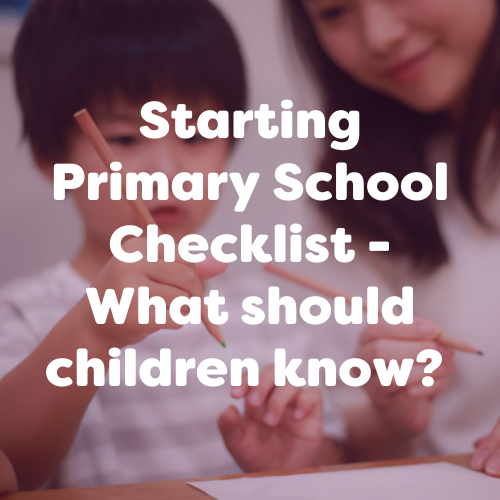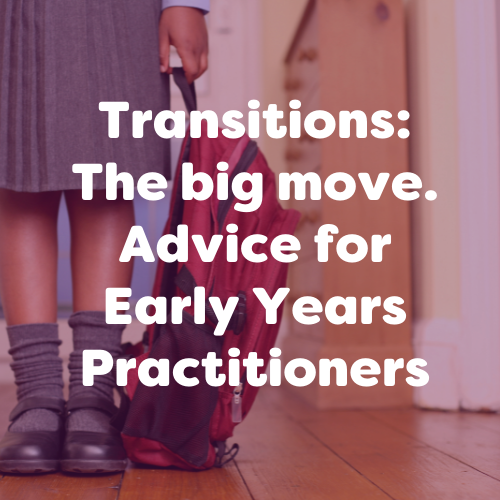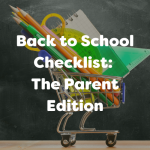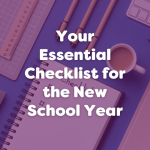If you have a little one starting school for the first time in September it’s likely you will be wondering “What do they need to know?” This starting primary school checklist blog will answer this question by delving into the key skills that would be useful for children in advance of school, how you as the caregiver can support them and also what they will be learning once they start in reception.
Research has shown that preparing children for school in a positive manner has an impact, not only on their happiness through their time in their new setting but also on how they view transitions in the future.
What should children know before starting school?
Please be aware that these points are merely to be used as a guide to aid development and not to be used as a checklist. It is important to remember that all children are unique and will develop differently.
Self-care and independence

- I can use a knife and fork
- I can open my own packed lunch
- I can button and unbutton my own clothes
- I can put my shoes and socks on and take them off independently
- I can be away from my parents
- I can look after my belongings
- I can wash and dry my hands independently
- I can use the toilet independently
- I know when to wash my hands
- I can wipe my own nose
How can you help?
- Talk to children about the importance of good hygiene in relation to a variety of scenarios for example hygiene when using the toilet or blowing their nose
- Create opportunities for independence e.g. letting them use the bathroom by themselves
- Teach your little ones how to use and care for their toys and belongings and trust them to do so independently
- Give lots of opportunities for practice e.g practice opening their lunchbox and eating properly
- Encourage independent efforts and be there to support as and when needed but not take over e.g when a child holds their arm out for you to put their coat on, encourage them to try themselves
- Implement a structured routine at home for both morning and night
Social skills and playing with others

- I can share toys and take turns
- I can play with others
- I can interact with other children
- I can be sensitive to others’ feelings
How can you help?
- Provide activities that promote turn taking for example board games
- Encourage children to play with other children from different backgrounds and be inclusive
- Choose toys and books that will encourage children to express their feelings and question them on feelings of other people or characters.
- Explain why it is important to listen when others are speaking
Maths and counting

- I can practise counting with objects
- I can say number rhymes and play counting games
- I can recognise some numbers
How can you help?
- Use number language in a variety of situations
- Provide number labels for children to use
- Model and encourage use of mathematical language. For example ask children questions like how many toys will fit in this box?
Communication, language and literacy

- I can experiment with different shaped scribbles
- I can practice holding a pencil correctly
- I can recognise my own name when written down
- I am looking at picture books and engaging in stories
- I can follow instructions
- I can ask for help when I am unsure
- I can communicate with adults with words and feelings
How can you help?
- Notice and encourage the marks children make
- Include opportunities for writing during other activities
- Model writing for a purpose e.g. writing a shopping list
- Focus on meaningful text such as your child’s name or letters
- Read stories that children already know and pause frequently to give them the opportunity to read and associate the words they know with the text
Classroom “behaviour”

- I can ask questions
- I can sit still for short periods of time
- I can talk about myself, my needs and my feelings
How can you help?
- Try using sand timers to help extend concentration for children who find this tricky
- Name and talk about a wide range of feelings and emotions
- Model how you label and manage your feelings
What will my child be learning in Reception?
Numeracy
This will primarily focus on learning about numbers and how to work with them. They might use a number line to help them add, subtract and count.
Science/Understanding the World
Your little ones will be using IT equipment to find out information and will be being asked to observe, reason and discuss.
Literacy
Your child will begin storytelling and writing by starting with communication, role play, listening and show and tell activities. They will begin the process of learning letters, high frequency words and will be taught phonics to segment and blend for reading and writing.
Some final tips
Some key things to note before beginning to prepare your little one for school are:
- Your child does NOT need to be able to read, write or do sums before starting school
- The most important thing is to relish the time before school by having fun!
- Try not to stress your little one out with lots of talk about school and equally, don’t over hype it
- Try walking or driving past the school often to give your little one some context and allow it to become a familiar building
- If you would like some more activities to try with your little ones to get them “school ready” then check out our previous blog “How can I support my child to be school ready?“





